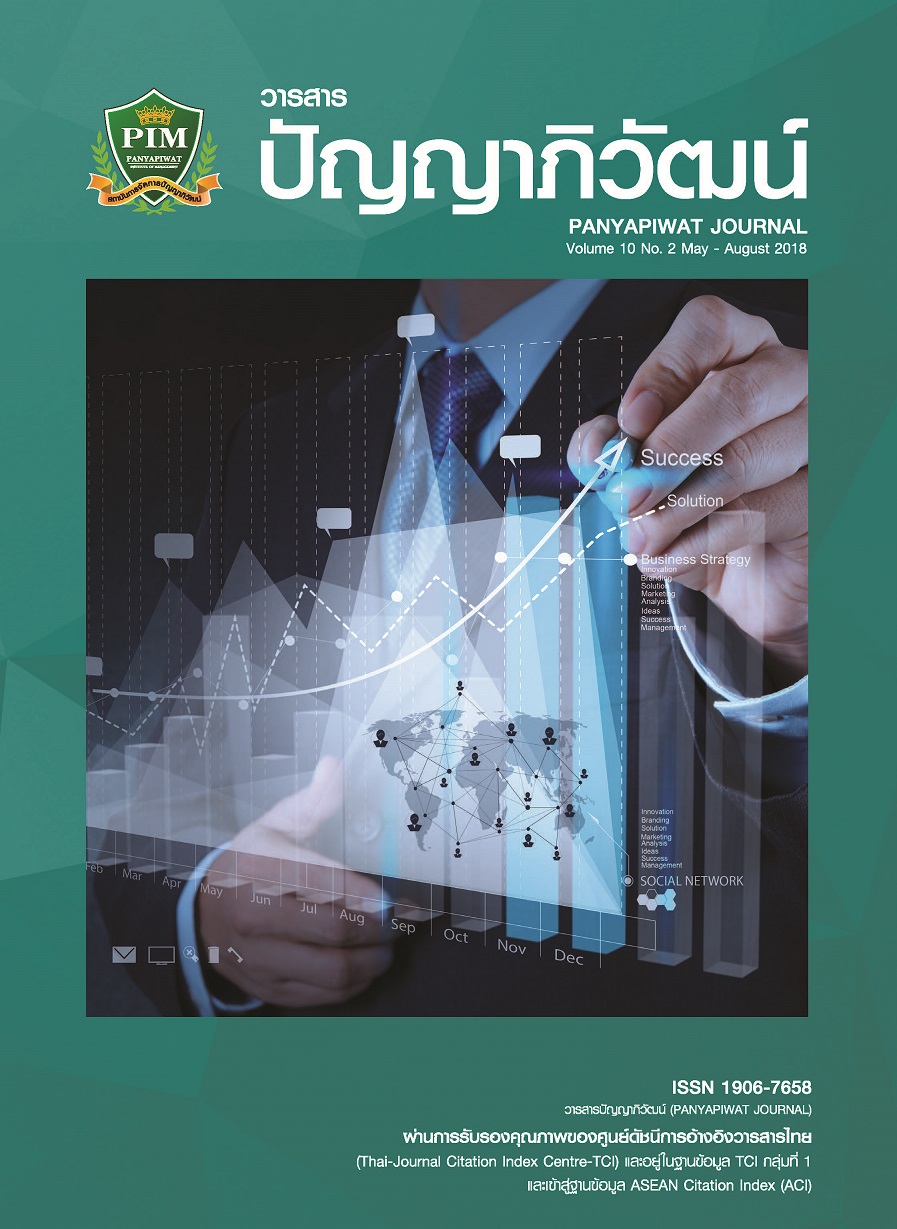ผลกระทบของความสามารถภายในองค์กรต่อผลการดำเนินการด้านนวัตกรรมการบริการ ผ่านทางความสามารถในการเรียนรู้ของธุรกิจโรงแรม
Main Article Content
บทคัดย่อ
การวิจัยนี้มีวัตถุประสงค์เพื่อพิจารณาหาปัจจัยเชิงประจักษ์ของความสามารถภายในองค์กรที่ส่งผลต่อความสามารถจัดการองค์ความรู้ (KMC) และผลของความสามารถจัดการองค์ความรู้ต่อผลการดำเนินการด้านนวัตกรรมการบริการ โดยความสามารถภายในองค์กร หมายถึง ทรัพยากรภายในองค์กร ซึ่งประกอบด้วยทรัพยากรบุคคลและการสร้างความสัมพันธ์กับซัพพลายเออร์ บริษัทด้านการท่องเที่ยว และหน่วยงานภายนอกต่างๆ ความสามารถจัดการองค์ความรู้ หมายถึง ความสามารถในการสร้างและแสวงหาองค์ความรู้ การรวบรวมข้อมูลใช้เทคนิคการเลือกตัวอย่างตามเกณฑ์ (โรงแรมระดับ 3-5 ดาว) โดยการสัมภาษณ์ 60 โรงแรม การส่งจดหมาย 700 โรงแรม และการส่งจดหมายอิเล็กทรอนิกส์ 100 โรงแรม การเก็บรวบรวมข้อมูลโดยแบบสอบถามจากโรงแรมในประเทศไทย มีแบบสอบถามจำนวน 136 ชุดที่ใช้สำหรับการวิเคราะห์ข้อมูล สมมติฐานทดสอบโดยเทคนิคการวิเคราะห์ถดถอย (Regression analysis) ผลการวิจัยพบว่า ความสามารถภายในองค์กรส่งผลเชิงบวกต่อความสามารถจัดการองค์ความรู้ นอกจากนี้ผลการวิจัยยังแสดงให้เห็นถึงผลกระทบเชิงบวกของความสามารถจัดการองค์ความร้ตู ่อผลการดำเนินการด้านนวัตกรรม
การบริการ ดังนั้นโรงแรมควรพัฒนาขีดความสามารถภายในองค์กรเพื่อเพิ่มประสิทธิภาพของความสามารถจัดการองค์ความรู้ ซึ่งส่งผลต่อผลการดำเนินการด้านนวัตกรรมการบริการ
Article Details
“ข้าพเจ้าและผู้เขียนร่วม (ถ้ามี) ขอรับรองว่า บทความที่เสนอมานี้ยังไม่เคยได้รับการตีพิมพ์และไม่ได้อยู่ระหว่างกระบวนการพิจารณาลงตีพิมพ์ในวารสารหรือแหล่งเผยแพร่อื่นใด ข้าพเจ้าและผู้เขียนร่วมยอมรับหลักเกณฑ์การพิจารณาต้นฉบับ ทั้งยินยอมให้กองบรรณาธิการมีสิทธิ์พิจารณาและตรวจแก้ต้นฉบับได้ตามที่เห็นสมควร พร้อมนี้ขอมอบลิขสิทธิ์บทความที่ได้รับการตีพิมพ์ให้แก่สถาบันการจัดการปัญญาภิวัฒน์หากมีการฟ้องร้องเรื่องการละเมิดลิขสิทธิ์เกี่ยวกับภาพ กราฟ ข้อความส่วนใดส่วนหนึ่งและ/หรือข้อคิดเห็นที่ปรากฏในบทความข้าพเจ้าและผู้เขียนร่วมยินยอมรับผิดชอบแต่เพียงฝ่ายเดียว”
เอกสารอ้างอิง
Alaarj, S., Abidin-Mohamed, Z. & Bustamam, U. S. B. A. (2016). Mediating Role of Trust on the Effects of Knowledge Management Capabilities on Organizational Performance. Procedia-Social and Behavioral Sciences, 235, 729-738.
Chien, C. C., Lin, H. C. & Ya-Hui Lien, B. (2015). Capability contingent: the impact of organisational learning styles on innovation performance. Total Quality Management and Business Excellence, 26, 14-28.
Damanpour, F., Walker, R. M. & Avellaneda, C. N. (2009). Combinative effects of innovation types and organizational Performance: A longitudinal study of service organizations. Journal of Management Studies, 46(4), 650-675.
Davenport, T. H., De Long, D. W. & Beers, M. C. (1998). Building Successful Knowledge Management Projects. Sloan Management Review, 39(2), 43-57.
De Souza Bermejo, P. H., Tonelli, A. O., Galliers, R. D., Oliveira, T. & Zambalde, A. L. (2016). Conceptualizing organizational innovation: The case of the Brazilian software industry. Information and Management, 53(4), 493-503.
Du Plessis, M. (2007). The role of knowledge management in innovation. Journal of Knowledge Management, 11(4), 20-29.
Goffin, K. & Mitchell, R. (2005). Innovation Management: Strategy and implementation using the pentathlon framework (2nd ed.). NY: Palgrave MacMillan.
Gold, A. H., Malhotra, A. & Segars, A. H. (2001). Knowledge Management Capabilities: An Organizational Capabilities Perspective. Journal of Management Information Systems, 18(1), 185-214.
Groff, T. R. & Jones, T. P. (2003). Introduction to Knowledge Management: KM in business. Burlington, MA: Butterworth-Heinemann.
Hamel, G. & Skarzynski, P. (2001). Innovation: The New Route to Wealth. Journal of Accountancy, 192(5), 65-68.
Kasikorn research center. (2016). Hotel business competitive environment 2016. Econ Analysis, 23(2826), 1-5. [in Thai]
Leiponen, A. & Helfat, C. E. (2010). Innovation objectives, knowledge sources, and the benefits of breadth. Strategic Management Journal, 31(2), 224-236.
Livesay, H. C., Lux, D. S. & Brown, M. A. (1996). Human factors and the innovation process. Technovation, 16(4), 173-186.
Mattsson, J. & Orfila-sintes, F. (2014). Hotel Innovation and Its Effect on Business Performance. International Journal of Tourism Research,16(4), 388-398.
Minor International Public Company Limited. (2016). 2016 Annual Report. Retrieved June 27, 2017, from https://mint.listedcompany.com/misc/ar/20170303-mint-ar2016-en.pdf
Mohammed, A. A., Rashid, B. B. & Tahir, S. (2014). The mediating influence of marketing capabilities on the relationship between knowledge management and organization performance in hotel industry. Middle-East Journal of Scientific Research, 19(12), 1679-1689.
Nonaka, I. & Takeuchi, H. (1995). The knowledge-creating company: How Japanese companies create the dynamics of innovation. New York: Oxford University Press.
Nonaka, I. & von Krogh, G. (2009). Perspective—Tacit Knowledge and Knowledge Conversion: Controversy and Advancement in Organizational Knowledge Creation Theory. Organization Science, 20(3), 635-652.
OECD/Eurostat. (2005). Oslo Manual: Guidelines for collecting and interpreting innovation data. In The Measurement of Scientific and Technological Activities (3rd ed.). Paris, France: OECD Publishing.
Sveiby, K. (2001). A knowledge based theory of the firm to guide in strategy formulation. Journal of Intellectual Capital, 2(4), 344-358.
Tamkin, P. (2005). The Contribution of Skills to Business Performance. Brighton, U.K: Institute for Employment Studies.
Thomas, R. & Wood, E. (2014). Innovation in tourism: Re-conceptualising and measuring the absorptive capacity of the hotel sector. Tourism Management, 45, 39-48.
Weathersby, G. B. (1999). The learning you need now. Management Review, 88(8), 7.
Weerawardena, J., O’Cass, A. & Julian, C. (2006). Does industry matter? Examining the role of industry structure and organizational learning in innovation and brand performance. Journal of Business Research, 59(1), 37-45.
Yang, Y. Q. (2012). The Research of Service Process innovation. 2012 Fourth International Conference on Multimedia Information Networking and Security, 471-474.
Zaheer, A. & Bell, G. G. (2005). Benefiting from network position: Firm capabilities, structural holes, and performance. Strategic Management Journal, 26(9), 809-825.


